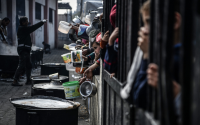19 October 2005
 |
Condoleezza Rice |
The Bush administration has long said that it has a winning, rather than an exit strategy, in Iraq.
In her first appearance before the key Senate committee in more than a year, Ms. Rice provided details of what she said was a plan already in motion to help the Iraqi government score a "decisive victory" over the insurgents.
She said together with Iraqi units, U.S. troops are clearing out insurgent strongholds including those along the Syrian border and expanding the secure areas, while bringing government services to them and creating a sense of hope and self-reliance through economic development.
To execute the strategy, the United States will restructure part of its mission in Iraq, deploying civil-military Provincial Reconstruction Teams to help local Iraqi authorities provide services, based on a successful U.S. program under way in Afghanistan.
The more than three-and-a half hour session was marked by critical questioning of the Secretary by members of both parties, who pressed her for specifics about when Americans can expect the 140,000 U.S. troops in Iraq to return home.
The committee's ranking Democrat, Joseph Biden, said he was not asking for a withdrawal deadline, but at least some idea as to when the U.S. mission in Iraq might end.
 |
Joseph Biden |
Ms. Rice told Mr. Biden she was confident U.S. commanders do have assessments about when a troop drawdown might begin, but said they have done things "in the right way" by focusing on preparing Iraqi forces to operate independently.
The Secretary, in a statement earlier, said setting a deadline would only encourage the insurgents, who she said from their own writings appear to believe they can demoralize and outlast U.S. and coalition forces.
"The enemy forces have never won even a platoon-sized battle against our soldiers and marines," she said. "But their ultimate target is the coalition center of gravity: the will of America, of Britain, and of other coalition members. Let us say it plainly. The terrorists want us to get discouraged and quit. They believe we do not have the will to see this through."
Under questioning from another Democrat, Senator Paul Sarbanes, Ms. Rice refused to speculate as to whether U.S. troops might still be in Iraq five or ten years from now.
She said insurgents may be capable of carrying out attacks for "quite a long time" and said it is vital to avoid a situation in which the United States withdraws prematurely and leaves Iraqi forces incapable of dealing with the insurgency.
In the course of the hearing, Ms. Rice also expressed renewed concern that Syria is knowingly allowing Islamic militants to transit its territory to join the Iraq insurgency, and said that Iran may be supporting militias and insurgents in southern Iraq.
Under questioning from Republican Senator Lincoln Chafee, Ms. Rice said the administration is pursuing a diplomatic course with both Syria and Iran.
But she also said she would not "circumscribe" President Bush's war powers by promising to seek advance congressional authorization for military action against either country.
"The President retains those powers in the war on terrorism and the war in Iraq," she added. "But I will say to you that on the matter of both Syria and Iran, our course is one that on one hand is working on the Syrian border militarily, at the Euphrates and the like, to try and clear that area of insurgent strongholds and to prevent the tracking of people back across the border. We are on a diplomatic course to try to get pressure and help with the Syrians to get them to take very specific actions that would stem the flow from that side of the border."
Ms. Rice said despite the absence of diplomatic relations with Iran, the United States has indirect channels of communication with the Tehran government.
She also disclosed that the administration is considering having direct contacts, limited to the subject of Iraq, between the U.S. ambassador to Iraq Zalmay Khalilzad and his Iranian ambassadorial counterpart in Baghdad.






